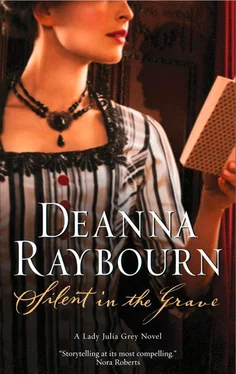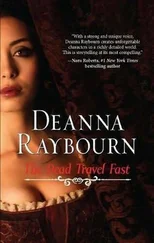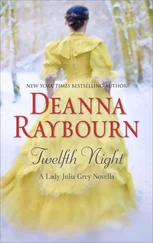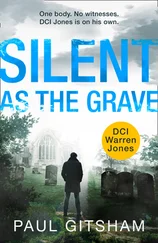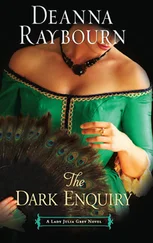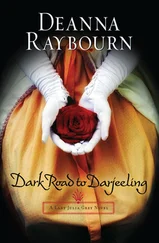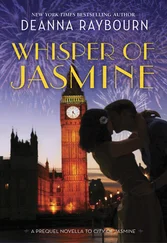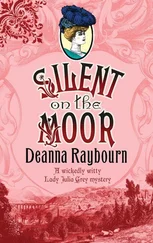But why the notes, then? Would they not serve as a warning to Edward? He would have been on his guard, surely, against such an attack. Or would he have been naive enough to believe that his murderer would strike openly, that he would have a chance to defend himself? I knew nothing of his thoughts, his fears during those days. Edward kept no diary, no written record of his days. And he had clearly felt incapable of confiding in me, I thought bitterly.
I looked at my hands and realized that I must have already decided upon a course of action whether I realized it or not. I had folded the note carefully and placed it in a plain envelope. There was only one person to whom I could turn now.
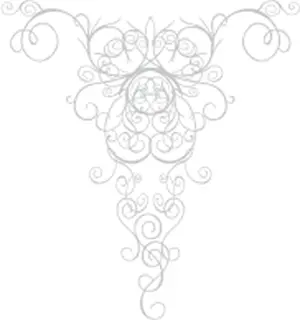
Nay then, let the devil wear black, for I’ll have a suit of sables.
—William Shakespeare
Hamlet
It does me no credit to admit that I had difficulty in deciding what to wear to call upon Nicholas Brisbane. I had thought myself cool and composed, but I kept hearing Portia’s voice, reminding me that he would not think of me beyond that first call at Grey House. I also kept thinking of Mariah Pilkington’s assessment of him as a lover, but that does me no credit, either.
Portia had been ruthless in her attack upon my wardrobe. Scarcely a garment remained after her onslaught. She began the devastation by throwing out anything she deemed “busy,” discarding everything with ruffles, tassels or fringe.
“And above all, no ruching, unless you want to look like some poor misguided woman’s parlor drapes,” she cautioned.
I gazed mournfully at the heap of clothes I had acquired upon Edward’s death. There was several hundred pounds’ worth of bombazine and velvet and lace tumbled together on the bed, and not a single garment truly flattered me. “Then what shall I wear?”
She cocked her head to the side, considering my figure carefully.
“Simplicity, my darling. Things that are beautifully draped and excellently cut need no embellishment. I shall take you to my dressmakers. They are brothers, trained in Paris as tailors, and no one in London cuts a better line. They are frightfully expensive and rather rude, but they are just the ones to take you in hand. Besides, these frowsy things will not fit you when I’ve had done with you.”
“What do you mean they won’t fit? What do you mean to do with me?”
“I mean,” she said, propelling me toward the cheval glass, “to fatten you up. Look at yourself, Julia. Really look. There’s beauty there, but you are a sack of bones. An extra stone will round out your face and arms, give you curves where you have none. You will be lush and healthy-looking, like Demeter.”
I grimaced at her in the looking glass. “Edward always liked me thin.”
She swung me around to face her. “Edward is gone now. And it is quite time to find out what you like.”
I smiled at her. “Then why am I letting you boss me about?”
“Because I know what is best,” she said, wrinkling her nose. She dropped a quick kiss on my cheek. “Now, pastries for you at teatime, extra gravy on your joints, and as much cream as you like. When you’ve put on a few pounds, we shall take you off to the brothers Riche and my hairdresser and see what they will make of you.”
I agreed because it was simpler and because it seemed to make Portia so happy. Besides, Morag had already spied the discarded clothes and scooped them up to be sold at the stalls in Petticoat Lane. I strongly suspected she would do me some sort of bodily injury if I tried to infringe upon her rights as a lady’s maid to sell my cast-offs.
In the end, I quite liked Portia’s changes. My hair was cropped, baring the length of my neck and the smallness of my ears. It was an immediate success—Morag’s hairdressing skills being fairly nonexistent. Now, rather than struggling to frizz several pounds of stubbornly straight hair, she had only to fluff the little halo of curls that had sprung to life when the length was scissored off.
In the end we compromised on the weight. I gained half a stone, which was entirely ample. For the first time in my life, I had a figure that could be described as feminine, with a soft, curving line I did not recognize. I took to wearing delicate earrings and snug, exquisitely tailored jackets cut like a man’s. Sometimes I looked at myself in the cheval glass and I hardly knew who I was anymore. I did not look like my father’s daughter or Edward’s wife. I was simply Lady Julia Grey now, widow, and she was a person I did not know.
But she was a person who knew how to dress, I thought with some satisfaction as I prepared to call upon Mr. Brisbane. I instructed Morag to button me into my black silk with the swansdown trim. It was a stunning costume, perhaps the most elegant in my wardrobe. It lent me a confidence I did not feel as I drew on my black gloves and motioned for Morag to pin my hat into place. The hat was trimmed with a slender band of swansdown, and there was a muff to match. The afternoon had turned cold and grey and I was glad of my warm finery as Diggory, the coachman, bundled me into the town coach with rugs for my lap and hot bricks for my feet. I had made certain that Simon was napping peacefully and the Ghoul was settled in with a glass of warm gin and a stack of black-bordered correspondence fresh from the post. I felt giddy, like a child let out of school on holiday as the coach drew away from the kerb.
Mercifully, it was a short drive to Chapel Street. I waited while Henry, the footman, jumped down and pulled the bell sharply for me. He stood for a few minutes, preening himself in the glass panel of the door. He was an insufferably vain creature, but there was no denying that he did look rather splendid in his livery. I admired his calves and thought about Portia’s suggestion of taking a lover. There was a family precedent for that sort of thing, my great-aunt had eloped with her second footman, but the idea held little attraction for me. If nothing else, footmen were not noted for their intelligence, and if there was one quality I knew I must have in a lover, it was a quick wit.
There was no reply, and Henry looked to me for instructions, his soulful blue eyes remarkably blank.
“Knock,” I called irritably. “There must be someone at home.” I said this as much for my benefit as for his. I had steeled myself for this errand once. I was not certain I could do so again. At last the door was opened by a small, plump creature liberally dusted with flour. Henry returned to hand me down from the carriage.
“Ooh, I am sorry,” the little woman said, ushering me over the threshold. “I did not hear the bell. I was making a pudding for my gentleman’s dinner, I was. What may I do for you, madam?”
She had taken in the presence of the footman returning to the carriage and eyed my clothes with an accurately appraising glance. Brisbane must have had a number of privileged callers, I surmised.
“I wish to see Mr. Brisbane. I am not expected, but I do hope he can spare me a few moments.”
She bobbed respectfully, wiping her hands on her apron. “Oh, of course, madam. There is a chair for you. I won’t be but a minute.”
I was relieved that she did not ask for my card, but it occurred to me that many of his visitors would appreciate such discretion. She was back before I had settled myself comfortably.
“He will certainly see you now, madam. May I bring some tea?”
“That will not be necessary, I do not expect to stay long,” I said, rising. The plump little housekeeper escorted me up the stairs and knocked once on the door.
Читать дальше
